South Africa
Faces of Xenophobia: The Victims, Part 1
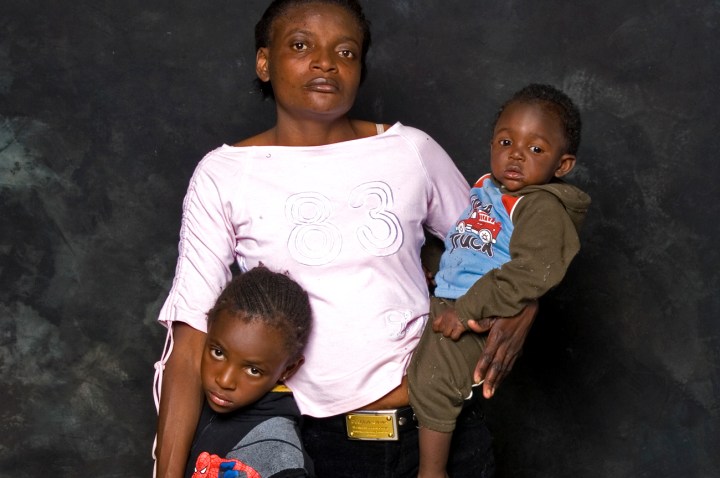
As South Africa anxiously waits to see if there will be a repeat of the xenophobic violence, we look back at some of the victims of those 2008 attacks. Meet some of the faces behind the headlines, the people who lost everything – and were lucky to escape with their lives, unlike some of their compatriots. Lest we forget. By TANYA PAMPALONE.
The Woman and Her Children (main photo)
Benita, Meto and Frankie Ntumba
“Disgusting!” the eight-year old shrieks, and springs toward her little brother, pulling away the crumbled bread Frankie has just picked up from the ground and is trying to insert into his mouth. Benita Ntumba is just eight but she is doing all the talking because her English is better than her mother Meto’s, and because she is a bright girl who, out of necessity, has come to learn adult things. Her father is a security guard working in Cape Town. He will come soon to get them, she tells me. Then the girl explains how her family came to live in South Africa. It is all quite simple to understand. So simple that a child can explain it. “We left Congo because of the war,” she tells me. “They were going to kills us there so we ran away. Here, people came to our house and they found out we were not South Africans and they wanted to kill us. So we ran away.”
The True Believer
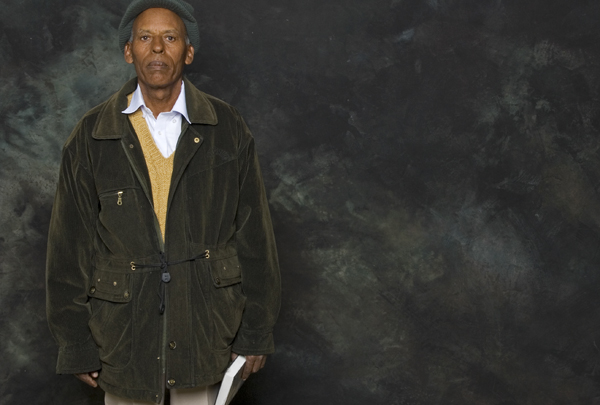
Stephanos Worku Abeto
He carries the Holy Bible with him everywhere he goes. It is wrapped in clear plastic, the pages are crisp and white, its message is clear and concise. It is so different from what lies before him. Here, everything is temporary. Here, the future is uncertain. Stephanos Worku Abeto was an important man in Hossana, a small town in the Ethiopian Highlands. It is where his wife, his nine children and his nine young grandchildren still live. His parents were farmers and he studied agronomy at university in Ethiopia and France, but he ended up working in politics for much of his life. And although he was in the ruling party – the Ethiopian Peoples Revolutionary Democratic Front – he had to leave his country. “I told them they weren’t following the constitution!” he says. “They said, you are against us! They wanted to make me go to jail. So I escaped.” In 2005 Worku Abeto came to South Africa and started a business with other Ethiopians selling blankets and comforters door-to-door. But when the violence came, all his stock was taken, along with the R80 000 in cash he had saved. “They came and chased us away,” he says, clutching his Bible. “They were kicking me. It was terrible. They are in a bad spirit, the devil’s spirit. Now I am waiting for full peace. Only God knows when it will come. We are waiting for the government. We are waiting for God.”
The Philosopher King
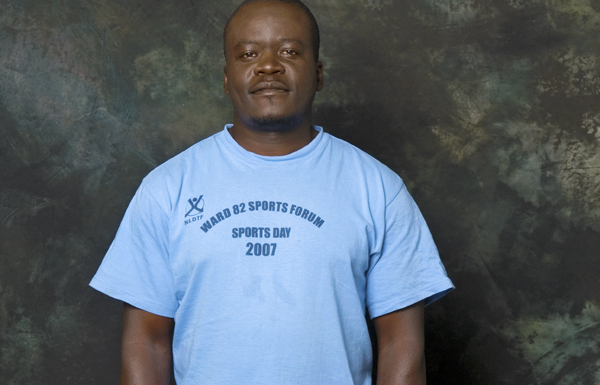
James Osumba
He holds court on the stoep outside one of the ubiquitous white tents that he has dubbed Parliament. He is seated on an upturned bright yellow plastic washing tub, with a group of young men gathered around him in a tight circle.
James Osumba talks of revolutionary things. Today his discourse runs the gamut from South Africa to Kenya, from the UK to the US. There is much to discuss on the periphery of nowhere, on the edge of nothing, on a patch of barren brown grass with no trees to shield the biting cold wind.
Osumba has been in South Africa since 2002, initially making his way selling sweets on a street corner in downtown Johannesburg and sleeping under bridges at night. He moved on, getting a job in a nappy factory; then as a security guard, moving up quickly, handling the schedules, the inventory, supervising.
After all, this is a man who spent two years studying commerce at the University of Nairobi, until he was kicked out for his involvement in student politics. His crime: questioning the generous bursaries given to the sons of politicians. He left home for South Africa. After all, where could he go? “You go up, those are terrorists there,” Osumba says. “You go west, there is war. East there is war.” But no matter. Everything is in the past now.
As is his shop – the booming buy and braai operation he had set up on the main intersection in Tsakane. It was looted, emptied out, every bit of stock and his computer taken. The 29-year-old managed to keep a few books, which help expand his philosophies – mostly one-man monologues, with a few murmurs and snickers and nods from the other parliamentarians when he gets on a roll.
“The old generation of leaders, that’s the problem in Africa,” he says. “There is no vision to uplift the standards of the black people. There is no leadership. They aren’t looking after this tribe or that tribe. They think only: it’s our time to eat. Look,” he gestures to the spread of tents on the desolate plot of land before him. “Look at what we have done to ourselves.”
The Widow
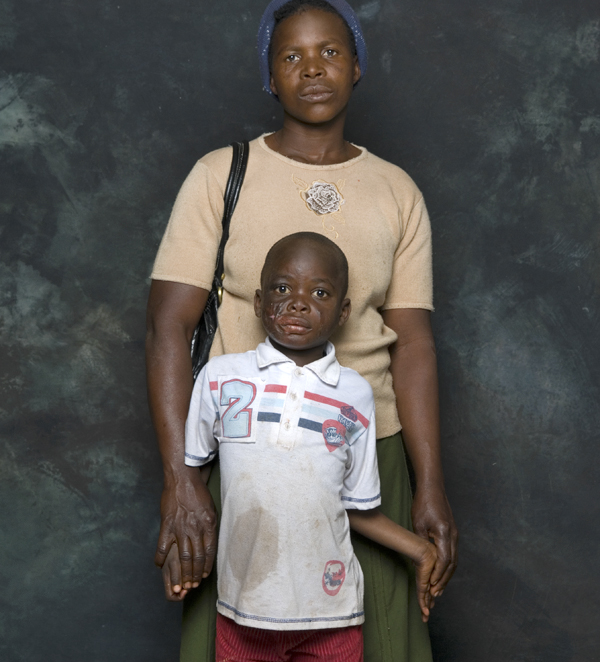
Thapelo Regina and Armado Mashaba
Outside Thapelo Regina Mashaba’s tent, three fish are baking on an open fire. The widow has opened up shop in the camp – a woman has to make a buck; there are five children to support, school fees to pay. Only Armado, her youngest, the six-year-old with a scarred face of broken blisters, of pink and black patches, is here at the camp. The other children are staying with friends in Soweto. They must go to school.
She asks in Tsonga, through a translator, if her picture is taken will someone help them? If someone hears her story, will someone come forward, help her piece her life back together? I shake my head and look down. I tell her I do not know. I tell her I am sorry. She blinks and looks straight ahead.
It has been a hard year for Mashaba. In February, her youngest son fell into a fire as she was trying to burn the hair from the head of a cow she was preparing to sell in her small food store – the shop where she sold meat and fish, vegetables and fruit. Armado spent the month in a Boxburg hospital.
It has been even more hard for Mashaba since 2004, since her husband died. He was a builder and, before he died, he built her a five-room shack near Primrose. It was her salvation, a place where she could run her shop. Now it is gone, her business and her home, dismantled in the violence, the zinc roof that held it together sold for cash at the local scrap yard. “They told me they don’t like foreigners,” says Mashaba, who was born in a village in Mpumalanga. “They do not like me because I am Shangaan.”
The translator looks down at the brown grass beneath us, and shakes his head. He does not want to tell me what comes next. Finally he looks up and it comes out. “She says she is feeling like she can die now.”
The Boxer
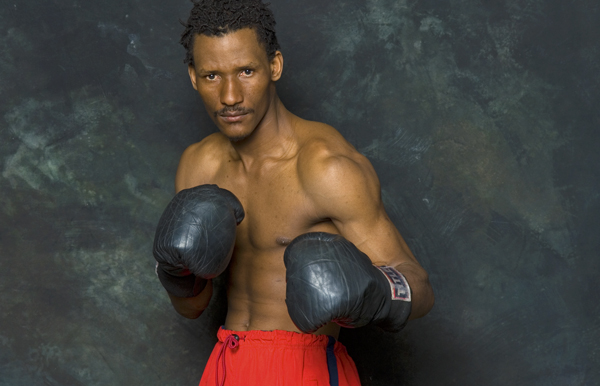
Karage Suba
His red punch bag swings from a thick tree branch in the far corner of the dirt lot he has called home for the past three weeks. He is waiting to be transported back to his own country, where it is safer. The boxer from Tanzania sits down, reaches into his pocket and pulls out a small stack of carefully folded newspaper clippings. He opens them gingerly, presses out the creases on the dried grass and then hands them over. “Karage Suba to Fight Perpetual,” reads one headline. The story was in a Malawian newspaper last year and his face smiles from the picture; gloves on his hands, ready to fight. The boxer has been in South Africa for just eleven months. “People in my country say if you want to make money in boxing you must go fight in South Africa,” he says. So he came. By himself, fresh-faced and 21 years old, training every day at a gym in Primrose where he would spar with some of South Africa’s best. But then the violence broke out and the other boxers made it clear that it was time for him to go. “The young boxers, they don’t like me,” he says. “So they say, Mr Suba you must leave this country. Everything you got here, you must leave here. And then you must leave this country. I don’t like South Africa now. I like peace.”
Photos: Sally Shorkend
Read More:
- Faces of Xenophobia: The Victims of 2008 attacks, Part 2 in DAILY MAVERICK.
















 Become an Insider
Become an Insider